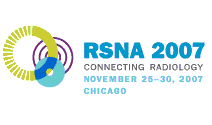
Abstract Archives of the RSNA, 2007
Charles M. Intenzo MD, Presenter: Nothing to Disclose
John Kairys MD, Abstract Co-Author: Nothing to Disclose
Jeffrey Miller MD, Abstract Co-Author: Nothing to Disclose
Serge Jabbour MD, Abstract Co-Author: Nothing to Disclose
Sung M. Kim MD, Abstract Co-Author: Nothing to Disclose
David Capuzzi MD, Abstract Co-Author: Nothing to Disclose
Scintigraphic imaging using Tc-99m sestamibi is a routine diagnostic procedure for the localization of parathyroid adenomas (PTA). while a PTA appears as an area of focal tracer retention throughout the examination, parathyroid gland hyperplasia (PGH) classically presents as a negative study (i.e. no discrete area of tracer retention). However, upon follow-up of scan results, we found instances where our interpretation as parathyroid adenoma or double adenoma was diagnosed histologically as asymmetric PGH. Our goal was to determine the various scan findings on all patients who underwent parathyroid scintigraphy, who had histologically-proven PGH.
Over a 2-year period, we gathered the available pathology reports of all patients who underwent parathyroid scintigraphy. We then tabulated a list of patients whose pathology reports indicated PGH for the final diagnosis, and compared them to the scan results.
A total of 33 patients were ultimately diagnosed as having PGH. Of these, 8 patients had normal scans. 10 patients demonstrated 2 areas of tracer retention so their parathyroid scan reports were interpreted as "double parathyroid adenoma". 15 patients demonstrates one area of tracer retention on the parathyroid scan and were interpreted as parathyroid adenoma. The pathology reports of the 10 patients reported as having double adenoma and the 15 patients reported as having a single adenoma, all had the final histologic diagnosis of "asymmetric parathyroid gland hyperplasia".
On sestamibi parathyroid scintigraphy, parathyroid gland hyperplasia can appear as a normal scan, or as 1 or 2 areas of focal tracer retention depending on the degree of parathyroid cellularity of the gland observed by the pathologist. In our series of 33 patients with PGH, 24.2% had normal scans, 30.3% had 2 areas of tracer retention, and nearly half (45.5%) had one focus of retention, mimicking a parathyroid adenoma.
Parathyroid gland hyperplasia has several sestamibi scan appearances.
Intenzo, C,
Kairys, J,
Miller, J,
Jabbour, S,
Kim, S,
Capuzzi, D,
Variable Scintigraphic Patterns of Parathyroid Gland Hyperplasia. Radiological Society of North America 2007 Scientific Assembly and Annual Meeting, November 25 - November 30, 2007 ,Chicago IL.
http://archive.rsna.org/2007/5011292.html

